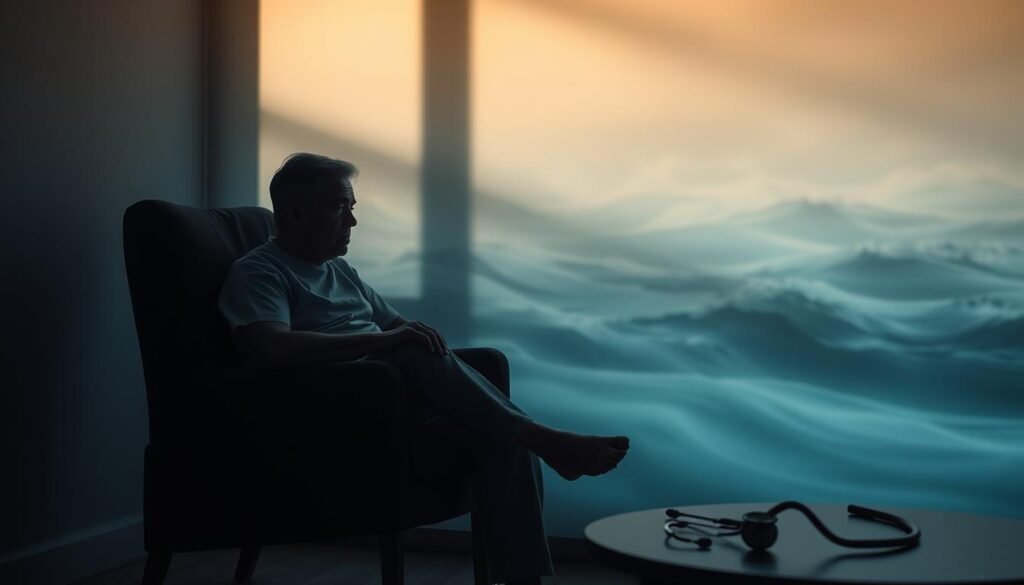Studies show that up to 70% of people with cancer feel extremely tired at various stages. This kind of tiredness, called cancer-related fatigue (CRF), is tougher to deal with than normal fatigue. About 50% of those who survive cancer talk about this overwhelming tiredness that hits their physical, emotional, and mental health. It’s vital to understand CRF to better handle its effects and help patients improve their life quality.
Spotting the signs and causes of CRF lets patients and doctors fight this widespread issue more effectively. Cancer treatments like chemotherapy and surgery often lead to long-lasting fatigue. That’s why it’s key for people to find the right ways to lessen its impact. This article aims to shed light on cancer-related fatigue and guide patients to live better every day.
Key Takeaways
- Cancer-related fatigue significantly impacts quality of life.
- It can persist before, during, and after treatment.
- Multiple factors contribute to fatigue in cancer patients.
- Effective communication about fatigue with healthcare providers is crucial.
- Various treatment options and lifestyle changes can help manage fatigue.
Understanding Cancer-Related Fatigue
Cancer-related fatigue (CRF) is a profound and often debilitating condition. It affects nearly 65% of people with cancer. This overwhelming tiredness doesn’t always go away with rest. Factors like the cancer type, stage, treatment methods, and personal health can affect CRF severity.
CRF can appear at different times—before, during, or after treatment. This fatigue can last for a long time, making daily tasks hard. It can also harm relationships, making those affected feel isolated.
Fatigue’s intensity and duration can vary, depending on the cause. Over 80% of those getting chemotherapy or radiation report serious fatigue. Certain cancers, especially blood cancers, can lower red blood cell counts. This makes exhaustion worse.
Other factors adding to fatigue include hormonal changes from cancers like breast and prostate cancer. Gastrointestinal cancers can affect food processing. Plus, treatment side effects like infections and pain can contribute to fatigue. While some find relief within 6-12 months after treatment, others might deal with CRF for years.
People with pre-existing conditions like anxiety or depression may face a higher risk of CRF. Managing fatigue is key to improving life quality during and after cancer. Knowing the various aspects of CRF helps patients and caregivers tackle this tough part of cancer treatment.
What Causes Cancer-Related Fatigue?
Cancer-related fatigue is common among people with cancer. It deeply affects their lives. The causes of fatigue and cancer are complicated and vary.
Cancer changes how the body works and can cause inflammation. This leads to severe tiredness. Treatments like chemotherapy and radiation also contribute to fatigue. For example, chemotherapy can cause anemia, making patients feel even more tired.
After surgery, patients might feel tired for weeks or months. Radiotherapy can make fatigue worse during and after treatment. Hormone treatments for cancers like breast and prostate can also make patients tired by lowering hormone levels.
Emotions like stress, anxiety, and depression affect fatigue too. Health problems such as heart disease, thyroid issues, and diabetes can make fatigue worse. Many patients suffer from cachexia, which is losing weight and muscle from inflammation.
Handling cancer-related fatigue takes a comprehensive approach. Always talk to healthcare experts for advice tailored to your situation.
Symptoms of Fatigue in Cancer Patients
Fatigue in cancer patients is much stronger than just feeling tired. Almost everyone with cancer, about 90%, feels this heavy tiredness. Symptoms of cancer-related fatigue differ, affecting daily lives. Signs of this fatigue include:
- Persistent tiredness that rest doesn’t help.
- A feeling of heaviness in limbs, making it hard to move.
- Emotional exhaustion, leading to feelings of sadness or getting easily upset.
- A lack of motivation for activities once enjoyed.
- Difficulty concentrating, making thinking tasks hard.
Symptoms can change daily, making it hard for patients to keep a normal routine or see friends. Emotional problems, like worry or feeling low, can mix with tiredness. This means doctors and care teams need to really understand and help.
Even after treatment, fatigue can stay for a long time. Half of the survivors say they can’t sleep well. It’s important for those looking after them to get what they’re going through. Helping in the right way makes a big difference. Combining mental health care and staying active can help fight the tiredness cancer brings.
| Fatigue Indicator | Description |
|---|---|
| Persistent Tiredness | Feeling of exhaustion that isn’t relieved by sleep |
| Heaviness in Limbs | A sensation that makes limbs feel very heavy |
| Emotional Exhaustion | Running out of emotional energy, leading to easy annoyance |
| Lack of Motivation | Not wanting to do things that used to be fun |
| Difficulty Concentrating | Hard to focus and complete thinking tasks |
Describing Your Fatigue to Your Healthcare Team
Talking about cancer-related fatigue (CRF) is key to getting the right healthcare support. You need to say how tired you are and how it messes with your day. To measure fatigue, a scale from 1 to 10 is used. 1 means you’re barely tired, and 10 means you’re very tired. This scale helps your healthcare team understand how bad your fatigue is.
To talk about fatigue well, cover a few areas:
- Onset and Duration: Say when the fatigue started and how long it’s been going on.
- Variations: Talk about if your tiredness changes throughout the day or week. Mention if anything in particular makes it worse.
- Impact on Daily Life: Explain how being tired affects your everyday tasks, job, and hanging out with others.
Clear talk about fatigue helps experts create plans just for you. This could mean advice on eating better, staying active, or getting mental health support. All to improve how you feel.

Grasping the details of your fatigue allows for better tailored treatments. Checking in often helps note any changes, offering deep insights for care. Keeping conversations going means you get the help and tools needed to tackle fatigue. And that boosts your life quality.
| Fatigue Assessment Parameters | Details |
|---|---|
| Duration | Weeks/Months since onset |
| Severity Scale | 1 (no fatigue) to 10 (extreme fatigue) |
| Triggers | Activities, stressors, or situations causing fatigue |
| Impact | Effects on daily living and emotional health |
| Associated Symptoms | Muscle weakness, difficulty concentrating, sleep issues |
Effective Treatment Options for Fatigue
Cancer-related fatigue (CRF) is a common problem during and after cancer treatment. It can affect a person’s life deeply. Many factors, like tumor growth, chemotherapy, and feeling stressed, can cause CRF. So, it’s important to treat these causes to improve fatigue.
Doctors usually suggest different ways to help, including medicine for anemia and pain. If someone is feeling down, talking to a counselor can help them feel better. Also, improving sleep and eating better are key to feeling more energetic.
Physical activity is very important too. The National Comprehensive Cancer Network (NCCN) recommends starting with easy exercises. This should be done in a way that doesn’t make the person too tired. People who exercise often feel less tired, studies say.
A table below shows different ways to manage CRF. Each method focuses on a specific area:
| Treatment Option | Description | Potential Benefits |
|---|---|---|
| Medications | Use of erythropoietic agents to combat anemia | Improved hemoglobin levels and fatigue reduction |
| Counseling | Emotional support through professional guidance | Enhanced coping strategies and lowered distress |
| Exercise | Structured physical activity plans | Increased energy levels and reduced fatigue |
| Nutrition | Dietary adjustments to promote health | Better overall nutrition and energy management |
| Sleep Interventions | Therapies targeting sleep quality | Improved restfulness and lower fatigue levels |
Using these strategies can really help improve someone’s life with CRF. It’s vital to talk about these options with care teams. This ensures a good plan to manage cancer fatigue.
Tips for Managing Fatigue and Cancer
Cancer-related fatigue is a big challenge for many. It affects their life quality. But with the right fatigue management strategies, they can feel better. Here are some key tips to tackle this issue.
Physical Activity and Exercise
Regular physical activity for cancer patients can ease fatigue. Activities like walking or light strength exercises for 3 to 5 hours weekly boost energy. Occupational and physical therapists can help make exercise plans that fit the patient’s needs. This makes the exercise journey more manageable and fun.
Nutrition and Healthy Eating
Good nutrition is vital for energy. A balanced diet with vitamins and about 8 to 10 cups of fluids daily is key. Focusing on nutrition helps with both physical health and energy. It makes you feel better too. Talking to a nutritionist can give you tips for the best food choices.
Energy Conservation Techniques
Using energy wisely can help manage fatigue. List important tasks and spread them throughout the day. This avoids too much tiredness at once. Minor changes, like dressing the lower body first or using grab bars, save energy. Short naps, ideally 15-20 minutes in the early afternoon, can also help without affecting nighttime sleep.
Palliative Care and Support
Palliative care looks at both physical and emotional needs to fight fatigue. Staying socially active with loved ones provides emotional support. This lowers stress and tiredness. Relaxation methods can offer extra relief. Healthcare experts can give more personalized advice. For more fatigue management tips, check out this resource.

Sleep Disturbances in Cancer Patients
Sleep troubles are common for cancer patients. Studies show that up to 75% of them have sleep issues. These problems can last for years after finishing treatment. They greatly affect well-being. Sleep issues can make feelings of tiredness, pain, and sleepiness worse.
Impact of Poor Sleep on Fatigue
Poor sleep makes cancer patients feel more tired. Many have high fatigue levels because of sleep problems. For example, 21% might need help with daily tasks. This need is often due to not resting well. Sleep troubles can also lead to anxiety or depression. Spotting signs of chronic fatigue early is key. If tiredness lasts more than two weeks, it’s time to seek help.
Strategies for Improving Sleep Quality
It’s important to improve sleep to fight cancer-related fatigue. Here are some helpful tips:
- Maintain a consistent sleep schedule to regulate the body’s clock.
- Create a restful environment without too much light or noise.
- Avoid stimulants like caffeine and nicotine before bed.
- Engage in relaxation techniques, such as reading or stretching, to wind down.
- Cognitive Behavioral Therapy (CBT) and relaxation therapy can help with sleep troubles.
- Consult a sleep specialist for customized help if needed.
By following these steps, patients can improve sleep quality. This leads to better energy and life quality.
Psychosocial Support for Managing Fatigue
Cancer-related fatigue can be a big challenge for those in treatment. Psychosocial support is key in tackling this issue. Being part of social networks and accessing mental health resources helps a lot. Getting support from healthcare teams, family, and friends offers the emotional help needed, making the treatment journey easier.
Group therapy and personal counseling let patients share their experiences and how they cope. This helps lessen the feeling of being alone and builds community spirit. Recent studies show that psychosocial interventions have a big impact on reducing fatigue. These special programs for fatigue were 80% effective, much higher than the 14% for general ones.
Different techniques varied in how well they worked, depending on their type and duration. For example, cognitive strategies and mindfulness have been successful in lessening fatigue from cancer. These methods improve emotional health and help patients feel more in control of their health. Using these psychosocial supports greatly enhances the life quality of those who have survived cancer.
Patients should seek emotional support and consider joining support groups. Doing this is vital for building strength and getting better health results. Focusing on mental health through strong support systems can make a big difference in fighting fatigue from treatment. For more tips on coping with cancer fatigue, check out this resource.
Chronic Fatigue: When to Seek Further Help
Chronic fatigue is a big problem for many with cancer, greatly affecting their everyday lives. Knowing when to get help is crucial if you’re dealing with ongoing, severe tiredness. This can come from the treatments, the cancer itself, or from other sources like stress, not eating well, and not sleeping well.
Look for these signs that you need expert help:
- Persistent exhaustion that limits daily activities
- Difficulty concentrating or maintaining focus
- Sleep disturbances that do not improve with rest
- Ongoing muscle pain or discomfort
- A noticeable decrease in interest in usual activities
It’s important to realize how bad and how long your symptoms have been happening. Fatigue is especially worrisome when it gets in the way of doing basic things like cooking, cleaning, or taking care of yourself. Telling your doctors about what you’re going through is key. They can come up with plans specifically for you, helping to decide if you need a different approach to treatment.
If your tiredness doesn’t get better, even after trying to care for yourself, see your doctor. They might suggest medical treatments, exercise programs, or advice on eating better. Keeping your healthcare team updated means they can help manage your fatigue better. Knowing when to look for help is important for taking control of your fatigue and keeping your well-being on track.
Long-term Management of Cancer-Related Fatigue
Cancer-related fatigue (CRF) can be tough for those who have beaten cancer. It can linger long after treatment is done. A well-rounded plan is key for managing this fatigue effectively. It’s important to look at all factors that might contribute to it.
This fatigue can hang around for a long or short period. For example, fatigue usually spikes after chemotherapy sessions. How people recover from this varies greatly. Fatigue from radiation often gets worse toward the end of treatment, then slowly gets better. Surgery-related fatigue can kick in during recovery and be very stubborn.
Several things can make cancer-related fatigue worse. These include anemia, emotional stress, pain, and not sleeping well. Tackling these issues is crucial for managing fatigue effectively. Regular talks with doctors can lead to custom plans. These can include diet changes, exercise tweaks, and mental health support. Trying things like cognitive behavioral therapy or yoga might also improve well-being.
It’s really important to save energy wherever possible. Making small changes in how you do things every day can make a big impact on tiredness. Staying hydrated, eating well, and keeping active at the right level are key. Getting support from groups or community programs is also very helpful. It helps build strength and endurance among survivors.
For those wanting to dig deeper into cancer-related fatigue, the 3P model is a great resource. It talks about the biological, psychological, and lifestyle sides of fatigue. Understanding this model can help in creating specific plans to reduce symptoms and improve life quality for those dealing with long-term fatigue.

Conclusion
Managing fatigue is crucial for cancer patients. It includes medical care, lifestyle changes, and support from others. Recognizing fatigue’s complexity is crucial. It affects many undergoing chemotherapy and in palliative care.
A mix of strategies can help. These include talking openly with healthcare providers and getting the right exercise, diet, and sleep. These steps not only ease symptoms but also boost overall health for cancer patients. Being active in seeking help and finding ways to lessen fatigue is key.
By understanding and tackling cancer-related fatigue, people can handle their treatment better. With strong support and the right care, they can fight off fatigue. This helps them stay strong during tough times.